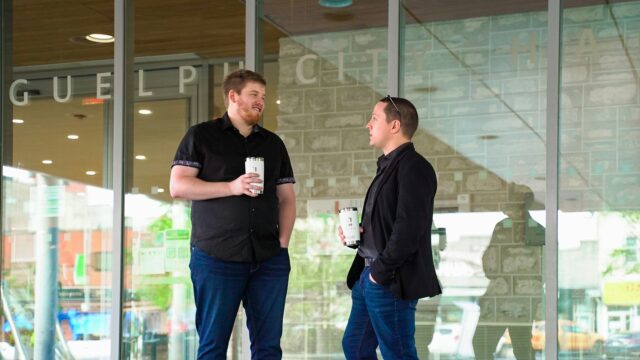Some things people say are no big deal in America—they might even be seen as polite.

However, use these phrases in the UK, and you’ll either get death stares, awkward silence, or an argument in the pub car park. Whether it’s a case of words having wildly different meanings or just sounding unbearably smug, here are some American-sounding phrases that don’t land well on British ears. They’re not the worst, but they certainly rub people up the wrong way, that’s for sure.
1. “Let’s circle back on that.”
 Source: Unsplash
Source: Unsplash To American ears, this sounds productive. British ears hear: “Let’s pretend we’re doing something while actually doing nothing.” It reeks of corporate nonsense, and most Brits will meet it with an eye-roll so hard it counts as exercise. Just say, “Let’s talk about it later” or “We’ll come back to it.” Anything else sounds like you’ve memorised a TED Talk script and refuse to speak like a normal person.
2. “I’m excited to share…”
 Source: Unsplash
Source: Unsplash This one’s all over US social media and work emails. In the UK, it’s borderline unbearable. We don’t get “excited to share” unless it involves winning free Greggs for life, or spotting a minor celebrity at Aldi. If you’re genuinely thrilled, that’s great, but tone it down. A simple “Just a quick update” or “Thought I’d let you know” feels a lot less like you’re launching a wellness brand.
3. “Can I get a water?”

In the States, this is standard ordering language. In the UK, it sounds like you’ve skipped every basic manners class. “Can I get…” lands like a command, especially if it’s barked out in a busy café. Swap it for “Could I have…” or even “Please may I have…” if you want to go full charming. Otherwise, enjoy the frosty silence from behind the counter.
4. “I don’t mean to be rude, but…”

Oh, but you do. Brits know this one’s never followed by anything helpful. It’s the phrase equivalent of someone winding up before a punch. If you start with this, expect defensiveness, even if your point is valid. Want to be heard? Drop the intro and just make your point kindly. Brits are far more responsive to subtlety than blunt preambles.
5. “That’s awesome!”

Americans say this all the time, and it’s usually meant sincerely. But in the UK, saying “awesome” about everyday things like a sandwich or someone’s new curtains feels a bit… much. Try “nice,” “brilliant,” or even “not bad” depending on tone. Yes, they sound underwhelming, but in Britain, that’s high praise. You’ll learn to love it.
6. “You guys should totally come!”

Sounds friendly, right? But in the UK, it can come across as pushy, especially if the invitation is casual or last-minute. Brits need time, excuses, and at least two opt-out opportunities before feeling socially safe. Try “If you fancy it…” or “No pressure, but we’re doing [thing] if you’re around.” It gives people room to say no, which they probably will, but at least you offered nicely.
7. “I’m gonna go ahead and…”

This phrase has major customer service rep energy. Brits hear it and immediately assume a script is being read. It’s not offensive, just overly formal in a way that makes people suspicious. Just say what you’re doing. “I’ll do that now” or “Let me sort it” lands better than sounding like you’re filing a report on yourself.
8. “We should touch base.”
 Source: Unsplash
Source: Unsplash This is classic American business speak, and it drives Brits silently mad. It feels vague, overly professional, and somehow both unnecessary and slightly creepy at the same time. If you want to meet or chat, say exactly that. “Catch up,” “have a quick chat,” or even “let’s go for a pint and talk it through” is far more likely to get a yes.
9. “You got this!”
 Source: Unsplash
Source: Unsplash This sounds encouraging and positive in the States. In the UK, it’s often met with awkward silence or a sarcastic “Cheers.” Brits are suspicious of high-energy support, especially if it comes with finger guns or excessive grinning. Encouragement here is quieter: a dry “You’ll be alright,” a nod, or if you’re lucky, a “Go on then.” That’s all the pep talk they need.
10. “How are you guys doing today?”
 Source: Unsplash
Source: Unsplash In America, this is how you open a shift at a diner or a Zoom call. In the UK, it feels forced. If a cashier says this in a chipper tone, Brits assume they’re trying to sell you something, or they’re American and deeply confused. “You alright?” or even “How’s things?” keeps it casual and doesn’t require a full life update. That’s the sweet spot for most Brits.
11. “Have a blessed day.”
 Source: Unsplash
Source: Unsplash Meant to be kind and warm, but it lands strangely in the UK, especially outside of religious contexts. It’s got major televangelist energy, and most Brits don’t know how to respond without breaking into nervous laughter. “Take care” or “Cheers” will always feel more natural on this side of the Atlantic. Keep your blessings for Christmas cards or when someone sneezes.
12. “I’ll reach out.”
 Source: Unsplash
Source: Unsplash Corporate America’s favourite phrase. In the UK, it sounds robotic. People don’t “reach out.” They message, call, or drop someone an email. “Reach out” feels like something a cult leader says before handing you a pamphlet. “I’ll drop you a message” or “I’ll get in touch” feels way more human. Plus, it doesn’t make people brace for a motivational talk.
13. “Good job!”
 Source: Unsplash
Source: Unsplash This works great for kids or golden retrievers. Say it to a British adult, though, and it can feel deeply patronising, especially in the workplace. You might mean well, but they’ll probably think you’re taking the mick. If you want to praise someone in the UK, “Nice one,” “Well done,” or a simple “That went well” lands far better. Less sparkle, more substance.
14. “That’s not a big deal.”
 Source: Unsplash
Source: Unsplash It probably isn’t, but saying it out loud can sound dismissive, especially here in Britain, where people often downplay their feelings already. This phrase can trigger quiet resentment rather than reassurance. Better to say “Don’t worry about it” or “It’s all sorted now.” Those carry the same message without sounding like you’re brushing it off completely.
15. “I’m obsessed with this.”
 Source: Unsplash
Source: Unsplash In the US, this means “I really like this thing.” Here, it can come off a little over the top, especially if you’re talking about something mundane, like a candle or a sandwich. Brits tend to save “obsessed” for actual obsessions (or at least TV shows), not their latest Primark find. If you want to fit in, maybe dial it back to “love this” and call it a day.




